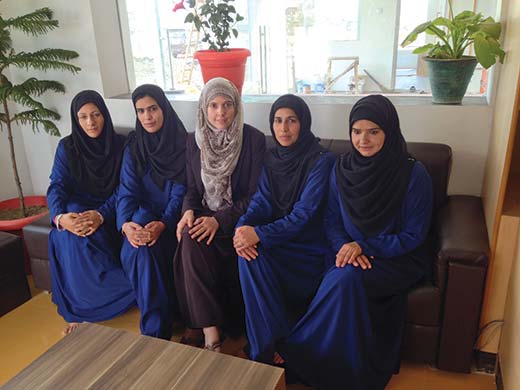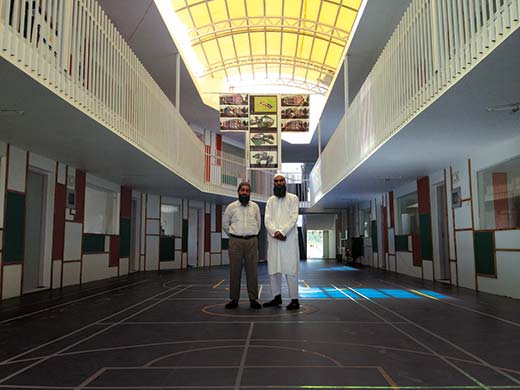Education is an evolving activity, so is the art of teaching and creation of educational infrastructure, tools and methods. R S Gull visits an upcoming initiative that is out of box from the first stone laid two years back
Ever since he graduated in electronics engineering from Bangalore’s Gousia College in 1994, Mubashir Aslam Wafaie has not only grown his beard. After a bit of trading, he quietly jumped into education sector and created his own space. But what is remarkable is his continuous experimentation with the new ideas.
In 2004 he set up Oasis, a cruche’ that evolved into a chain. Two years later, he brought Aloha into Kashmir and now, for the last three years, he is into a new initiative: The Foundation Trust that will run the Foundation World School, a Rs 46 crore initiative that offers a “world class” education from kindergarten to twelfth. This fall, it begins, what Mubashir says, its ‘organic growth’ by admitting 400 kids up to UKG level.
“Investing and earning is just a routine,” Mubashir says, “But what is different in this project is that it is completely out-of-box from creation of infrastructure, to the curriculum and even selecting the faculty.”

The initiative involves lot many people and almost eight crore rupees in the first stage. But it does not involve the bank. The infrastructure is owned by Aspire EduInfra Pvt Ltd, a company that engineer Tauseef A Lone heads. With an 11-year exposure in raising critical telecom infrastructure, Lone set up the company dedicated to the creation of educational infrastructure only, and offered shareholding to a number of people on basis of staggered returns. “This project has investment from 18 individuals and the company has built the infrastructure strictly on basis of the requirements a kids school requires,” Lone said. “We will hand over the infrastructure to The Foundation Trust (that Mubashir heads) and it will run the school on basis of an agreement.” Mubashir says the agreement is a long term one and may cross a minimum of two decades.
Lone hopes the investors should get their money back within eight years and then it depends on them whether they continue with the initiative or divest.

Infrastructure is impressive. Spread over 5 kanals of land on the Airport Road, it has a built-up area of 15400 sq ft, fully air-conditioned, a swimming pool, skating, cycling ring on the rooftop, wall-climbing and indoor sports area of 2600 sq ft. It even has an animal corner to help kids relate with life directly and not through TV.
For the curriculum, the Trust approached Cambridge International Examination, a non-profit of UK’s Cambridge that has 600 of Indian schools on its list of 10,000 schools across the world but none from Kashmir.
Selecting school head was a heady task. It failed to get the leader the managers desired and then eventually located Ms Ben M’lah Yasmine in Belgium using Skype. A psychologist with specialization in education and psychomotricity and keen interest in Kinesiology, Ms Yasmine is the daughte
r of a Tunasian father and British mother. She married a Raj Bagh hospitality professional in February 2012 and was shuttling between Europe and Srinagar to manage her mental health clientelé. “It was a tough process to be where I am,” Ms Yasmine said. “But it was an idea that I liked and joined.”

During her stay in Kashmir for so many years, Ms Yasmine has found very intelligent students “who write their examinations in English but are unable to speak the language!” This, she says is because the emphasis is mere memorization. “The fundamental difference that our curriculum will make is that we will not consider a kid a student who has to start acquiring education at a time when he or she requires developing social, emotional, language, cognitive and physical skills,” Ms Yasmine said. “This system of education helps us use application based techniques to make him learn voluntarily than by making him memorize.”
“For me, more difficult was to identify and recruit the teachers,” the principal, officially called Dean, said. “We got 650 applications and we selected 96 of them, got them into six groups for serious discussions on teaching and eventually identified 17 of whom six proved the best. We appointed four of them.”
The school has already acquired some GPS-fitted buses but it has taken some conscious decisions to stay away from the crowd. “We will take candidates from a radius of 7 kms and there is no examination at all – it has to be first come first admit basis,” Mubashir says. “We will encourage parents to send lunch boxes for their kids but will prevent any junk by giving them healthy menu.”
Mubashir says the entire set up is expensive and the costs will obviously go to the parents. Admitting a ward in this school may cross Rs 100 thousand. Asked that makes the initiatives a facility for elites, Mubashir says they have decided to compensate by taking 10 percent of the overall enrolment from underprivileged sections of the society. But they are yet to evolve a system that will govern that process. “It will be transparent and clean,” Mubashir insists. In addition, we are keen to take-up at least one government primary school to extend our system of education there.
















